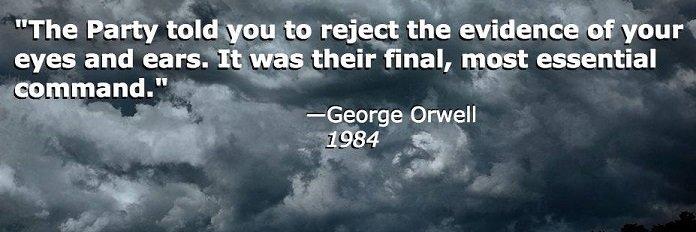-
Posts
3,024 -
Joined
-
Last visited
-
Days Won
19
Content Type
Profiles
Forums
Events
Articles
Everything posted by Wideleft
-
Floods, fires and deadly heat are the alarm bells of a planet on the brink By Sarah Kaplan July 12, 2023 at 7:49 p.m. EDT The world is hotter than it’s been in thousands of years, and it’s as if every alarm bell on Earth were ringing. The warnings are echoing through the drenched mountains of Vermont, where two months of rain just fell in only two days. India and Japan were deluged by extreme flooding. They’re shrilling from the scorching streets of Texas, Florida, Spain and China, with a severe heat wave also building in Phoenix and the Southwest in coming days. They’re burbling up from the oceans, where temperatures have surged to levels considered “beyond extreme.” And they’re showing up in unprecedented, still-burning wildfires in Canada that have sent plumes of dangerous smoke into the United States. Scientists say there is no question that this cacophony was caused by climate change — or that it will continue to intensify as the planet warms. Research shows that human greenhouse gas emissions, particularly from burning fossil fuels, have raised Earth’s temperature by about 1.2 degrees Celsius (2.2 Fahrenheit) above preindustrial levels. Unless humanity radically transforms the way people travel, generate energy and produce food, the global average temperature is on track to increase by more than 3 degrees Celsius (5.4 Fahrenheit), according to the Intergovernmental Panel on Climate Change — unleashing catastrophes that will make this year’s disasters seem mild. The only question, scientists say, is when the alarms will finally be loud enough to make people wake up. “This is not the new normal,” said Friederike Otto, a climate scientist at the Imperial College London. “We don’t know what the new normal is. The new normal will be what it is once we do stop burning fossil fuels … and we’re nowhere near doing that.” The arrival of summer in the Northern Hemisphere and the return of the El Niño weather pattern, which tends to raise global temperatures, are contributing to this season of simultaneous extremes, Otto said. But the fact that these phenomena are unfolding against a backdrop of human-caused climate change is making these disasters worse than ever before. What might have been a balmy day without climate change is now a deadly heat wave, she said. What was once a typical summer thunderstorm is now the cause of a catastrophic flood. And a day that is usually warm for the planet — July 4 — was this year the hottest ever recorded. Earth’s global average temperature of more than 17 degrees Celsius (62.6 Fahrenheit) may well have been the hottest it has gotten in the last 125,000 years. Otto is the co-leader of the World Weather Attribution network — a coalition of scientists who conduct rapid analyses to determine how climate change influences extreme weather events. Since 2015, the group has identified dozens of heat waves, hurricanes, droughts and floods that were made more likely or more intense by human-caused warming. Several events, including the 2021 Pacific Northwest heat wave that killed more than 1,000 people, were found to be “virtually impossible” in a world untouched by human greenhouse gas emissions. At this point, researchers say, the links between climate change and weather disasters are abundantly clear. When the planet’s average temperature is higher, heat waves can reach previously unheard of extremes. This was the case during recent heat waves in southeast Asia, southern Europe and North Africa, World Weather Attribution researchers found. When temperatures soar past about 40 degrees Celsius (104 Fahrenheit), or when they are compounded by extreme humidity, it becomes more and more difficult for people’s bodies to keep cool through sweating. Kids and the elderly, as well as outdoor workers and people with preexisting medical conditions, are especially vulnerable. This week, as more than 100 million people across the southern United States face exactly those conditions, climate researchers like Jennifer Francis fear the escalating heat may exact a deadly toll. “We’re seeing temperatures exceed those that can support life,” said Francis, a senior scientist at the Woodwell Climate Research Center. “Certain places are becoming uninhabitable.” “All of these records are being broken left and right, and my hope is people will start to put this together in their heads,” she continued. “These things shouldn’t be happening. It’s all connected to the fact that we’re warming the planet.” The warmer the air, the more water it can hold — turning the atmosphere into a thirsty sponge that sucks moisture out of vegetation and soil. This exacerbates droughts and sets the stage for wildfires like those that have ravaged Canada this summer. Temperatures in the Northwest Territories spiked to 100 degrees over the weekend, intensifying fires that were already burning out of control. The flip side of this phenomenon is that a warmer, wetter atmosphere also increases the amount of rain that can fall during a given storm. In Vermont and New York this week, about two months’ worth of precipitation fell in just two days — far more quickly than it could be absorbed by the region’s saturated ground and mountainous terrain. The effects of extreme rainfall are even more disastrous in poorer countries, where people and governments have far fewer resources to cope. Rachel Bezner Kerr, a Cornell University sociologist who works with farming communities in Malawi, lost two close colleagues this spring when flash floods struck the north of the country. Penjani Kanyimbo and Godfrey Mbizi drowned while conducting a surveys for a sustainable agriculture nonprofit, Soils, Food and Healthy Communities. “It’s one of those bitter ironies,” Bezner Kerr said. “They were trying to work on a solution. … But these parts of the world that are contributing so little to the problem are facing many of the worst impacts.” The severity of recent extremes on land has been matched only by the scorching conditions in the world’s oceans. Global average sea surface temperatures hit a record high this spring, and they remain nearly a degree Celsius (1.8 Fahrenheit) higher than the average for this part of summer. “In a way it’s more concerning” than the record-hot atmosphere, said Ted Scambos, a polar researcher at the University of Colorado at Boulder. While the land — and the air above it — warm up and cool down fairly easily, the ocean conducts heat far more slowly. “This means we’re storing a lot of heat in the ocean,” Scambos said. “The longer we wait [to act on climate change], the longer it’s going to take to have the ocean heat return to whatever normal is.” In the Atlantic Ocean and the Gulf of Mexico, bathwater ocean temperatures will probably add fuel to this year’s hurricane season, making storms wetter and more intense. And near the South Pole, where Scambos works, the record-hot oceans seem to have disrupted the current of cold water that typically surrounds Antarctica. This February, for the second year in a row, the extent of sea ice around the continent hit a record low. Now, even as Antarctica is immersed in the bitter cold of the months-long polar night, the ice has been distressingly slow to recover. That’s bad news for Antarctica’s glaciers, which need sea ice as a protective buffer from the jostling of ocean waves. “This is unlike any behavior we’ve seen in the past in the Antarctic sea ice world,” Scambos said. He tried to find words to express how it felt to watch the planet careen into such uncharted territory. “It’s ... ” he started. “Ahh ... ” He shook his head. “This is more or less the picture that we’ve been describing for decades,” he said. “And for as long as we can stand it, we’re in for this kind of climate and worse, until we address the problem.” The Intergovernmental Panel on Climate Change — which includes hundreds of the world’s top climate experts — has called for countries to roughly halve emissions by the end of the decade and eliminate planet-warming pollution by the middle of the century. Humans can unleash only about 500 more gigatons of carbon dioxide to have an even shot at keeping warming below a manageable threshold. But global carbon dioxide emissions hit a record high last year, and governments continue to approve new fossil fuel projects that would make it almost impossible for the world to meet its climate goals, scientists said. Bezner Kerr recalled her dismay at seeing President Biden approve the Willow Project — an Alaska oil development projected to generate 239 million metric tons of carbon dioxide over its 30-year lifetime — shortly after the deaths of her Malawian colleagues. “It was really like, what will it take for people to see that we are creating an unlivable planet?” she said. “I felt there was not the political will in this country to face the reality of what was happening.” Then smoke from Canada’s wildfires descended on her hometown of Ithaca, N.Y., staining the skies orange, and Bezner Kerr’s friends and colleagues started asking her for help processing their fear. Maybe, she thought, this would be a turning point. Maybe people are finally realizing: The alarm bells are ringing for us. https://www.washingtonpost.com/climate-environment/2023/07/12/climate-change-flooding-heat-wave-continue/
-
I'd like to add The Big Door Prize to the list of great under-rated shows. Only saw the premiere of Dark Winds with Zahn Mclarnan, but it's also a gooder. Season 2 starts in August and AMC is rebroadcasting season 1 just prior (6 episodes).
-
As they ponder whether purchasing the Premium vs Platinum package on their city-driven crew cabs....
-
Not satisfied until we score 100 points on offense in a game. Probably won't happen until Lawler is back and Wilson's easing-in process is complete, though.
-
Harper is blowing smoke up Erdogon's ass and Conservatives are proclaiming "Trudeau is destroying Canada!!!" Meanwhile:
-

Winnipeg Jets 2023 Off-Season Thread
Wideleft replied to TrueBlue4ever's topic in Winnipeg Jets Discussion
Hilarious because there are so many more important things to grind teeth over than how people spend. I'm immune to this conversation. -
The Beaverton @TheBeaverton On the one hand we're furious we didn't get -100%. On the other being more trusted than Rebel and Fox is hilarious. \/ Polling Canada @CanadianPolling Net Trust In (X): Weather network: +62% CTV: +55% Global: +53% CBC: +51% BBC: +42% Globe: +40% Canadian Press: +38% National Post: +30% CNN: +29% Macleans: +28% Toronto Star: +26% Sun papers: +4% Western Standard: -2% Beaverton: -5% Rebel media: -8% Fox: -27% - Pollara -
-

Winnipeg Jets 2023 Off-Season Thread
Wideleft replied to TrueBlue4ever's topic in Winnipeg Jets Discussion
Clicked on the link and apparently I've already blocked him. -
Reservation Dogs totally ignored again. Bullshit!
-
Under the "the best (my favorite) song I've never heard before, Sunny War with No Reason: She is a brilliant guitar player.
-
Did the whole FolkFest (including camping in the festival campground) for the first time. What an amazing experience with more great music and performers than I could believe. Really wondering why I hadn't done it before. Can't believe Charley Crockett evaded my radar prior, but his set absolutely blew me away. Now this is country music!
-
I agree if we're talking about Uvalde, but this is different.
-
If you have not seen The Russians Are Coming! The Russians Are Coming! (Arkin's film debut), you have missed a gem of a movie.
-
Taking a defensive position is not doing nothing and he was neither a policeman, border guard or FBI agent. He was a resource officer with the title of Sheriff's Deputy. What delay is therefore acceptable if he was found guilty? Are future "resource officers" going to feel compelled to run into harm's way for fear of legal repercussions when a methodical approach would be better? And why are we even discussing his culpability when the problem really isn't the response of school resource officers. The NRA for one appreciates this diversion.
-
Unlikeable because of his looks, so they make him look like Melissa Lantsman. TDot Resident @TDotResident #CDNpoli WHAT IS HAPPENING
-
He absolutely stole the show in So I Married An Axe Murderer.
-
The 2020 playoffs. He's mined the crap out of those 10 games with Columbus.
-

Winnipeg Jets 2023 Off-Season Thread
Wideleft replied to TrueBlue4ever's topic in Winnipeg Jets Discussion
As per the Freep: This was the first draft year since 2012 that the Jets did not draft any Europeans. Goalie Milic is from Coquitlam in case you were wondering. -

The Best Player to NOT win a Stanley Cup?
Wideleft replied to IC Khari's topic in Winnipeg Jets Discussion
1. Dionne used to be my choice, but now it's Joe Thornton 2. Claude Giroux 3. Ron Hextall or Carey Price -
Love me some Jamie Foxx. Language warning.
-
There were some really good articles posted about the guard shortly after the shooting. The simple truth is that his service pistol couldn't compete with an assault rifle. Just proves how stupid the armed guard idea is and he shouldn't have been the fall guy for lax gun laws and naively simplistic security policy. I don't blame him at all.
-
https://twitter.com/Cjmvsem/status/1674458926174310400?s=20 CJ - Sane Albertan Under a Parody Government @Cjmvsem Did he get tired of the Millhouse memes?
-
An incredible talent. One of the best comic deliveries of all time.
-

Bombers vs Als - Canada day weekend edition
Wideleft replied to The Zipp's topic in Blue Bomber Discussion






